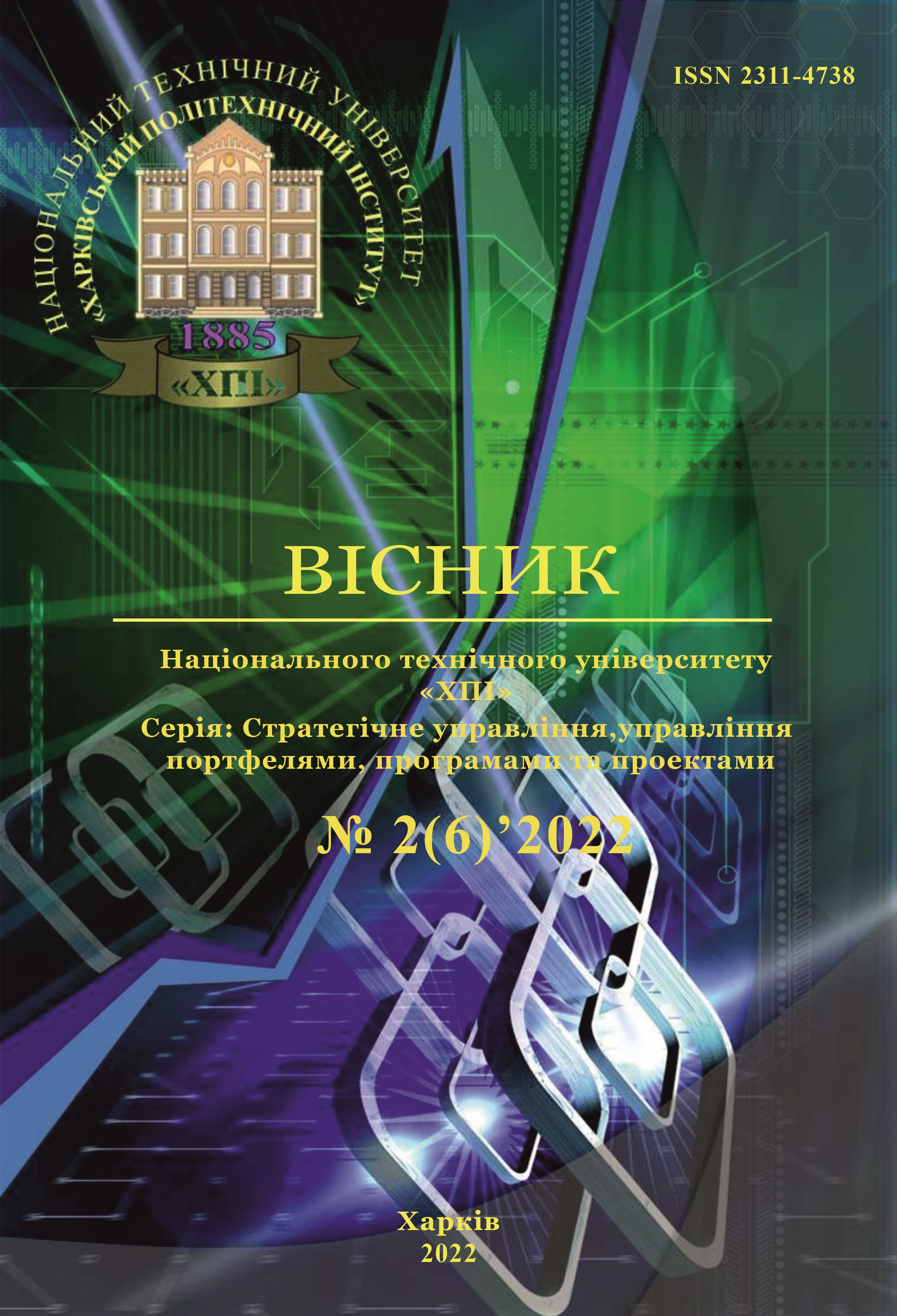MODELS OF INFRASTRUCTURE PROJECT MANAGEMENT BY MEANS OF HYBRID TECHNOLOGIES
DOI:
https://doi.org/10.20998/2413-3000.2022.6.7Keywords:
infrastructure project; project management; project environment; hybrid technologiesAbstract
In the scientific article the actual scientific and applied task of development of models of management the infrastructure projects by means of hybrid technologies is solved. A thorough analysis of research in the field of infrastructure project management and identified its unresolved part. Was conducted the analysis of the subject area of the state of implementation of infrastructure projects at the regional level; terminological base of scientific research; a system of normative legal acts in the field of financial regulation of infrastructure projects and programs at the regional level and standards for project management; international experience in implementing programs at the regional level; modern approaches to the management of infrastructure projects and programs at the regional level. A scientific and applied concept of hybrid management of infrastructure projects and programs at the regional level by means of convergence of knowledge systems for project management has been developed. Described the project environment of infrastructure projects and programs at the regional level, which includes the core implementation and operation of infrastructure projects and programs using hybrid technologies at the regional level, and four blocks underlying the set of parameters and values of such projects and programs. It is determined that the complexity of infrastructure projects and programs of the territorial system determines the problem of project management, and accordingly the complexity of projects. Thus, complex projects are projects with a high level of uncertainty of input data, high probability or magnitude of potential risks and the need to use different approaches in project implementation, including the involvement of a relatively large number of experts in different fields of specialization. Scientifically based methods and mechanisms of hybrid management of infrastructure projects and programs at the regional level allow to identify and implement possible measures to improve the situation in the region and improve the organizational and functional structure of resource management.
References
Bushuyev S. D. Project management: basics of professional knowledge and system of assessment of competence of project managers. К.: IRIDUM, 2010. 208 p.
Osnovyi individualnyih kompetentsiy dlya Upravleniya proEktami, Programmami i Portfelyami (National Competence Baseline, NCB Version 4.0) [Fundamentals of individual competencies for Project, Program and Portfolio Management (National Competence Baseline, NCB Version 4.0)]. Volume 3. Project portfolio management Bushuev S.D., Bushuev D.A.; Under the editorship of Bushuev S.D. K .: "Summit-Book", 2017. 168 p.,
Bushuieva N.S., Yaroshenko Yu.F., Yaroshenko R.F. Upravinnia proiektamy ta prohramamy orhanizatsiinoho rozvytku: navchalnyi posibnyk [Management of organizational development projects and programs: a study guide]. K: "Summit-book", 2010. 200 p.
Bushuev S.D., Bushueva N.S., Babaev I.A. i dr. Kreativnyie tehnologii v upravlenii proеktami i programmami [Creative technologies in project and program management] K: Summit Book, 2010. 768 p.
Rassel D. Archibald. Upravlenie vyisokotehnologichnyimi programmami i proektami [Management of high-tech programs and projects]. Issue 3, revised and additional - M.: Company IT; DMK Press, 2010. -464 p.
Zachko O. B., Kobylkin D. S., Kovalchuk O. I. Modeli formuvannia proiektnykh komand v bezpeko-oriientovanii systemi. Naukovyi zhurnal [Models of formation of project teams in a safety-oriented system]. Suchasnyi stan naukovykh doslidzhen ta tekhnolohii v promyslovosti [Scientific journal. The current state of scientific research and technology in industry], 2019, No. 4 (10), P. 2 - 6.
Zachko O. B. Monohrafiia. Bezpekolohichni zasady upravlinnia informatsiinymy systemamy ta proiektamy u tsyvilnomu zakhysti [Monograph. Security principles of management of information systems and projects in civil protection]. P. 188 - 241.
Zachko O. B. Intelektualne modeliuvannia parametriv produktu infrastrukturnoho proiektu (na prykladi aeroportu "Lviv"). [Intelligent modeling of infrastructure project product parameters (on the example of Lviv airport)]. Skhidno-Yevropeiskyi zhurnal peredovykh tekhnolohii [Східно-Європейский журнал передових технологій], No. 10 (61), 2013. P. 92-94.
Rak Yu. P., Zachko O. B., Rak T. Ye. Formal logical models of planning the computer trainer from working off the tactical skills of head of fire liquidation. Bulletin of the National University" Lviv Polytechnic"(Visnyk Natsionalnogo Universytetu "Lvivska Politekhnika"), 2010, P. 197-203.
Zachko O. B. Teoretychni pidkhody do upravlinnia bezpekoiu v proiektakh rozvytku [Theoretical approaches to safety management in development projects.]. Upravlinnia rozvytkom skladnykh system [Management of the development of complex systems]. 2015. No. 22. P. 48-53.
Guide to the Project Management Body of Knowledge (PMBOK® Guide). Sixth Edition. Project Management Institute. Publications, 2017. 496 pp.
ISO 9001:2015 Quality Management System/. Available at: https://www.i2iso.com/portfolio/iso-9001-2015
Downloads
Published
Issue
Section
License

This work is licensed under a Creative Commons Attribution-NonCommercial-ShareAlike 4.0 International License.
Our journal abides by the Creative Commons copyright rights and permissions for open access journals.
Authors who publish with this journal agree to the following terms:
Authors hold the copyright without restrictions and grant the journal right of first publication with the work simultaneously licensed under a Creative Commons Attribution-NonCommercial-ShareAlike 4.0 International License (CC BY-NC-SA 4.0) that allows others to share the work with an acknowledgement of the work's authorship and initial publication in this journal.
Authors are able to enter into separate, additional contractual arrangements for the non-commercial and non-exclusive distribution of the journal's published version of the work (e.g., post it to an institutional repository or publish it in a book), with an acknowledgement of its initial publication in this journal.
Authors are permitted and encouraged to post their published work online (e.g., in institutional repositories or on their website) as it can lead to productive exchanges, as well as earlier and greater citation of published work.

